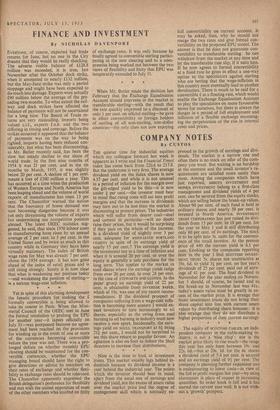FINANCE AND INVESTMENT
By NICHOLAS DAVENPORT EVERYONE, of course, expected bad trade returns for June, but no one in the City dreamt that they would be really shocking. The adverse visible balance of £128.8 million was exceeded, it is true, last November after the October dock strike, when it amounted to nearly £132 million, but the May-June strike was only a partial stoppage and might have been expected to do much less damage. Exports were actually £90 million below the average of the pre- ceding two months. To what extent the rail- way and dock strikes have affected the balance of payments will not be ascertained for a long time. The Board of Trade re- turns are very misleading, imports being valued c.i.f., exports f.o.b. and the two differing in timing and coverage. Before the strikes occurred it appeared that the balance of payments was on the way to being righted, imports having been reduced con- siderably, but what has been disconcerting, as Mr. Butler recently said, has been the slow but steady decline in our share of world trade. In the first nine months of 1954 it was 21 per cent. and in the six months to March, 1955, it was slightly below 20 per cent. A decline of 1 per cent. means a loss of £100 million a year. This has occurred at a time when the production of Western Europe and North America has been leaping ahead and the volume of world exports of manufactures has risen 13 per cent. The Chancellor warned the nation that the buoyancy of home demand was now becoming dangerous because it was not only threatening the volume of exports but undermining our competitive position abroad. The latest OEEC statistics sug- gested, he said, that since 1950 labour costs in manufacturing have risen by an annual average of 2 per cent. to 3 per cent. in the United States and by twice as much in this country while in Germany they have been virtually stationary. The index of British wage rates for May was already 7 per cent. above the 1954 average: it has now gone ahead of the index of retail prices and is still rising strongly. Surely it is now clear that what is weakening our position today —and weakening the position of sterling- ic a serious wage-cost inflation.
Yet in spite of this alarming development the lunatic procedure for making the £ formally convertible is being allowed to take its course in Paris. When the Mini- sterial Council of the OEEC met in June the formal resolution to prolong the EPU for another year—it lapses officially on July 31—was postponed because no agree- ment had been reached on the provisions for winding up in the event of one or more of the currencies becoming convertible before the year was out. There was a pro- longed debate on whether monthly EPU clearing should be maintained for the con- vertible currencies, whether the EPU managing board should have the right to give directions or advice to members on their rates of exchange and whether flexi- bility in exchange rates should be tolerated. The Chancellor apparently expressed the British delegation's preference for flexibility and met with the united opposition of most of the other members who insisted on fixity of exchange rates. It was only because he finally agreed to convertible sterling partici- pating in the new clearing and to a com- promise being worked out between the two views of flexibility and fixity that EPU was temporarily extended to July 31.
When Mr. Butler made the decision last February that the Exchange Equalisation Account should intervene in the market in transferable sterling—with the result that the rate quickly improved to a discount of only 1 per cent. on official sterling—he gave in effect convertibility to foreign holders of sterling of all non-sterling, non-dollar countries—the only class not now enjoying
full convertibility on current account. It may be asked, then, why he should not merge the two rates and give formal con- vertibility on the proposed EPU model. The answer is that he does not guarantee con- vertibility to transferable sterling : he can withdraw from the market at any time and let the transferable rate slip, if it suits him. If he now agrees to formal convertibility at a fixed rate he gives in effect a one-way option to the speculators against sterling who are betting that the wage-inflation in this country must eventually lead to another devaluation. There is much to be said for a convertible £ at a floating rate, which would enable the Exchange Equalisation Account to play the speculators on more favourable terms for ourselves, but there is always the danger in a period of full employment and inflation of a flexible exchange encourag- ing the perpetuation of the rise in internal costs and prices.


































 Previous page
Previous page